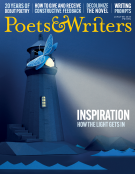I have never stood at the mouth of a volcano or watched one erupt in real time, thank God, but whenever I come across footage of one at its best, which is to also say at its absolute worst and most destructive, I am in awe. At well over a thousand degrees Fahrenheit, that river of lava flowing down a mountainside is beyond scorching hot, destroying everything in its path, leaving only rubble and char in its wake—and yet, how beautiful? An incandescent hellfire, pulsating red-orange, flexing like one long magmatic snake, it could rival the stars and sun with how brightly it burns.
Terrifying, yes, and also, we might attempt to mirror this ginormous force of nature in our art practices.
I don’t mean to suggest that what we are capable of unleashing with a pen or a keyboard is at all the same as the damage a volcano yields. Of course not. But I think we so often fear our own writing and put too much stock into what might be unleashed when we actually delve deep into the heart of a piece, that we hold ourselves back. We anticipate reader reactions (or, more truthfully, the reactions of our family and close friends), and our art suffers as a result of this great timidity. What power could we access if we gave in to the chaos roiling inside us? And why write if not to call upon the full depth of our feeling?
We might also consider patience. A volcano may remain active even if it has been centuries since its last eruption. Quantity in output may not be the goal here.
Look, I’m a dormant writer. What others may describe as fallow periods of inactivity, I see as stretches of time when I’m simmering. Stewing. Percolating. My imagination is never fully stagnant. Pages remain blank while I’m mulling over memories, observing strangers in the wild, staying attentive in my friendships and romantic relationship, daring to shake up my little routines in order to expand as a person. And dealing with my day job, that persnickety thorn in my side. Living, in a sense. As a writer my brain is always active. The way a dormant volcano is not yet extinct, quietly storing molten rock in its chamber until it can’t anymore. All that fire and pressure need to go somewhere! Once I’ve taken in enough experiences and let my mind wander until my thoughts cannot be contained inside my head any longer, I am able to write again.
But what does it mean to truly let loose, to erupt, to emote and flow, to not self-cauterize? To not shy away from a project but to write into it?
Admittedly this is my greatest challenge as a writer. In my earliest drafts I am almost always writing around the very thing I wish to write. I hesitate too much. I sidestep. My initial searching question falls away entirely, and I start writing next to the center. I’m excruciatingly careful, even to myself. I sometimes worry I’m not yet the writer I need to be in order to meet the story where it demands to be met. But really, the only way to write honestly and interestingly, and to grow into that level of writer, is to tackle whatever fear or question or pain or even joy you’re wishing to capture on the page, head-on. To fully interrogate it. In reality I don’t think we’re as subtle as we hope to be. What’s left off the page informs what we put on the page, and something personal is laid bare in that in-between space. Even when we try to hide from our own subject matter or suppress something we’re working through, our prose may betray us. Well, then. What we can control is whether that truth distilled onto a page is the most honest, rounded version possible. If the story told is the story we wished to share, not just glimpses and fits. The goal is to appear controlled, measured. But in order to get there, we first need to let everything out. For when a volcano erupts, it offers up everything it has to the world. We are mere mortals. Let us do the same with the knowledge that we can refine our chaos. We have revision on our side, and as many chances as we’d like to get it right.
Christopher Gonzalez is the author of the story collection I’m Not Hungry but I Could Eat (Santa Fe Writers Project, 2021). He splits his time between Brooklyn, New York, and Providence, Rhode Island, and can be found most places online, @livesinpages.








